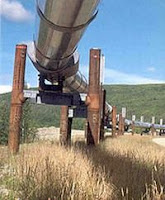With Columbus Day having recently just passed, the issues of colonialism and national identity will be fresh in many people’s minds. Columbus wasn’t the first European to arrive in the Americas, and indeed no European can be said to have discovered it given the thriving Indigenous peoples. Americans will be much more familiar and better equipped than I to talk about the vision of America’s manifest destiny. It was arguably a noble vision for a new nation. However, it is clear how far short of that vision the US has fallen, so that even in Alexander Humboldt’s, upon visiting America in 1804, could express such disappointment that revolutionary fervour didn’t yet extend to the emancipation of slaves.
The theological
underpinnings of oppression are nothing new, and not unique to the US. However,
in the “new world”, such ideas were given fresh impetus, running counter to the
revolutionary spirit of freedom. As Alfred Cave notes in his paper, Canaanites
in a Promised Land: The American Indian and the Providential Theory of Empire, Old Testament ideas of Canaan, the
Promised Land and the conquest, were used to oppress and dispossess the first
peoples. English settlers were cast in the role of God's new Chosen People,
whereas the first nation peoples were cast as the Canaanites, and seen as
idolaters, devil worshippers and savages. It was easy enough to justify
violence and extermination.
What’s often less
appreciated is the role the spread of diseases played in the invasion of the
“new” world. In the journal Nature in 2015, Simon
Lewis and Mark Maslin examined a number of definitions of the Anthropocene, the age of human
domination of the Earth’s major support systems. They document that estimates
of the regional
population of the Americas in 1402 range from 54 to 61 million people. Numbers
plummeted to about 6 million by 1650 due to introduced diseases, war, enslavement
and famine. Such a fall in population led to a collapse in agriculture and a
measurable drop in global carbon dioxide levels. Such a meeting of “old” and
“new” worlds demonstrates the connection between environmental destruction,
empire, colonialism and genocide.
The
conquest of Australia, my home country, lacked the narrative of chosen people
and promised land, but instead suffered under the myth of terra nullius.
In truth, Indigenous land use was many and varied, including permanent
settlements, aquaculture and extensive fire management. Bill Gammage in The Biggest Estate on Earth: How Aborigines Made Australia observes how often
Europeans admired how much like a gentleman’s garden the land appeared, but
totally ignore the gardeners. Terra nullius has been consistently used
to deny first peoples land rights and right to self determination.
The
colonialisation of land use and of national identity in both the US and
Australia continues into our management, or better still, mismanagement of
creation and continued ignoring of the wishes of First Peoples. In the US, the Standing Rock Pipeline in the North Dakota Plains once more
highlights how ideas of progress and growth trump the rights of Indigenous
people. With threats to drinking water and sacred sites, Dakota has become a
focus of discontent with the colonialisation of creation. The response has been
predictable, with dogs, pepper spray, strip searches and attempts to silence the
media. In Australia, criminalisation of protest is also used as a
tactic to protect unnecessary mining. This development affects indigenous artifacts and the site is the continued
subject of indigenous protest.
It
seems to me that there are various narratives that the gospel needs to undo.
The first is that of endless growth, fueled by our addiction to fossil fuels.
Bill McKibben has shown that most of the remaining fossil fuels need to be left in the
ground. This means that in order to stay below 2 C of
warming above pre-industrial levels, there needs to be no new coal mines and no
new pipelines. Our path into the 21st century and beyond needs to be marked not
simply with a shift to renewable energy. We also need to focus less on growth, as
Jesus said to focus less on the building of bigger barns. Likewise, with a
country like India signing on to the Paris climate agreement, we might give more
thought to how be better neighbours to a country that is facing its
climate responsibility, and yet has to lift millions out of darkness by
connecting them to electricity. [Updated 24/10/16] The WTO’s ruling against India’s domestic content requirements for solar panels is in my view, and example of not being a good neighbour. Surely at this point addressing climate change is more important than insisting upon forcing open markets.
We
also need to decolonialise our theology, and listen to indigenous voices on the
sacred nature of creation, particularly indigenous Christian voices. We tend to
read Genesis 1 through Francis Bacon, and view creation as a resource. John
Walton has helped us see creation as a sacred temple. It’s time to hear
more from the world’s first peoples on how they see creation as sacred. I’m
most aware of what has been done in Australia with Rainbow Spirit Theology, and imagine that
similar exists in the US. We need to have “ears to hear”, because we are not
dealing with the Canaanites we are called to destroy. We are dealing with those
whom God has placed in their places so that they might seek and find him (Acts 17:22-31) and with whom we share a common world. If we’re
to honour these people as made in the image of God, this world as God’s good
creation, and God as creator, we need to listen to them, to protest with them,
and to speak truth to power with them.
[This blog piece has been submitted to another site, but since I haven't heard back I'm putting it up here. I've updated the text on the WTO ruling, which previously read that it was against the Indian solar industry, rather than the amount of local components.]


